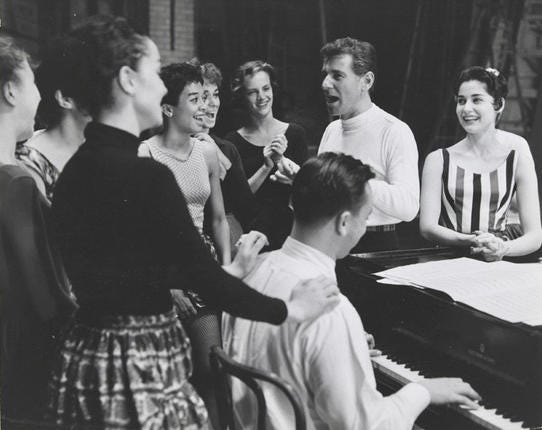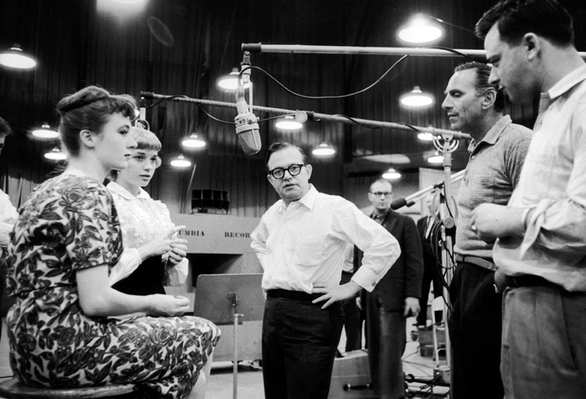Funny Things to Write on a Forum
FUNNY THINGS THAT HAPPENED ON THE WAY TO THE FORUM
May 8, 2018: Theatre Yesterday and Today, by Ron Fassler
Anyone fairly intimate with the biography of Stephen Sondheim, may be familiar with the story of how at the beginning of his career, the young composer craved nothing more than simple employment as both a composer and lyricist on Broadway. Upon graduating from Williams College in 1950, he worked diligently on his musicianship, studying composition privately with the distinguished Milton Babbitt. By 1955, he had completed an original musical, writing both words and music for Saturday Night, with a book by Julius Epstein, one half of the team (alongside his twin brother Philip) who wrote the 1943 film Casablanca. While Saturday Night's producer, Lem Ayers, was raising the money, he died, and so did Sondheim's dream of being a composer-lyricist with his name up in lights by the age of twenty-five. As it happened, he would be thirty-two when that particular destiny was fulfilled with the 1962 musical, A Funny Thing Happened on the Way to the Forum. There were, of course, two shows sandwiched in between where he only did lyrics — two little shows — nothing really to write home about.

The first was an updated musical version of Romeo and Juliet, to be composed by Leonard Bernstein, and with Betty Comden and Adolph Green as lyricists. But they couldn't get out of a Hollywood contract, and so Bernstein took on the task of lyric writing himself. Unfortunately, writing words to accompany his own music proved too great a hardship, which is when Sondheim was procured for what would later be titled West Side Story. At first, it was to be a co-lyric writing gig with Bernstein. "We worked together, but by the time we opened in Washington all the lyrics were mine, with some one or two-line exceptions," Sondheim writes in his 2010 book Finishing the Hat. "And so he very generously took his name off the lyric writer list."
Over the years Bernstein noted that this single act of generosity wound up costing him millions in residuals, as there was no way he could have predicted WSS's songs would wind up a royalties bonanza, the result of the show's highly successful film version. Bernstein would say this laughing, but one wonders if he really thought it was all that funny.
About the job offer for WSS, Sondheim has written: "I wanted to be asked to the party, I just didn't want to go. The fact was, and still is, that I enjoy writing music much more than lyrics, and even though Saturday Night was dead in the water, I was planning other projects." It was upon the wise counsel of his family friend Oscar Hammerstein II, that led Sondheim to say yes to WSS, when it was pointed out to him by his mentor that there were valuable lessons to learn on such a collaboration. Especially when the principals involved were not only Bernstein, but the show's book writer Arthur Laurents and its director, the formidable Jerome Robbins, who would also choreograph.

Though pleased to have gained the necessary experience WSS provided, and proud of his accomplishments, Sondheim has also spent a lot of time over the years self-deprecatingly disparaging some of what he wrote due to youthful oversights and overkill — "today the world was just an address," being his primary example. It was the first time he ever wrote lyrics to someone else's music and, as he stated, "the someone else was a legend verging on myth." And at just twenty-five when he began, no matter how much of a neophyte he may have been, Sondheim's work on WSS has most definitely stood the test of time these past sixty-one years.
His next job, for which he very much wanted to write both music and lyrics, was Gypsy. With a book by WSS's Arthur Laurents, it was conceived by its director-choreographer Jerome Robbins as a star vehicle for the one-and-only Ethel Merman. As someone whose first time singing on a Broadway stage had George and Ira Gershwin writing for her voice (1930's Girl Crazy), Merman was beyond spoiled, considering Cole Porter (five shows) and Irving Berlin (Annie Get Your Gun) were the caliber of composer she was used to working with. The one time in her long career that Merman took a chance on an unknown songwriting team, resulted in the unhappy musical Happy Hunting, just prior to her taking on Gypsy. It was acknowledged as one of the few failures among her dozen or more Broadway musicals and it didn't allow her the confidence in hiring Sondheim as both composer and lyricist. She wanted the indefaticable Jule Styne, who Sondheim reluctantly agreed to provide lyrics, since the project intrigued him and Hammerstein prodded him once again to accept, citing that writing for a star like Merman, and working a second time with such talents as Robbins and Laurents (plus Styne) was nothing he should turn down lightly.

Even with Gypsy a success that garnered excellent reviews, it did little for Sondheim in the way of a career move, since it was never his intention to be solely a lyricist for hire. It took the next four years for him to write a new show (this time on spec), one that would finally serve to introduce him to Broadway as a composer-lyricist.
Opening on this date, May 8, 1962, A Funny Thing Happened on the Way to the Forum was an enormous hit — in fact, the longest running of all of Sondheim's shows (964 performances) he has written to date. It won six Tony Awards, including Best Musical, but get this: not only did Sondheim not win for its score — he wasn't even nominated! That season the Tony committee found a dud of a musical, Bravo Giovanni, more worthy (it closed after 76 performances). Even when the film of Forum was produced in 1966, it jettisoned nine of its thirteen songs. Like the late Rodney Dangerfield: no respect.
Insult to injury also came in the form of the rave reviews Forum received for its original production, with Sondheim's contributions barely mentioned for praise (just like on Gypsy). With Forum, critics were too busy crediting its book by Larry Gelbart and Burt Shevelove, and with good reason, as it's one of the funniest ever written. Though effortless in execution, Forum came out of intensely hard and disciplined work, conceived over numerous drafts, with many disappointments along the way. Like Gelbart and Shevelove, Sondheim dug deep for the right balance for the show, and has often referred to the lyrics for Forum as "the most difficult set I've ever had to write."
Over time, Forum's score has come to be recognized for the superb craftsmanship it displays. After all, who doesn't admire the hilariously witty lyrics set to such an irresistible tune as "Everybody Ought to Have a Maid," which never fails to bring the house down? Or the airy and lilting "Lovely," used first to express youthful love and lust, and then low comedy when reprised as a song for Pseudolus to sing to Hysterium, who is forced to dress in drag to substitute for a dead virgin.

Now we're venturing into the plot of Forum, as thick as those woods that Sondheim would come up with years later for another musical. The smart move is to end this now. And so a happy 56th birthday to A Funny Thing Happened on the Way to the Forum!
If you enjoy these columns, check out Up in the Cheap Seats: a Historical Memoir of Broadway, now at Amazon.com in hardcover, softcover and e-book. Email me with comments or questions at Ron@ronfassler.org.
chengligaidaid1942.blogspot.com
Source: https://ronfassler.medium.com/funny-things-that-happened-on-the-way-to-the-forum-b045d30e24dc
Belum ada Komentar untuk "Funny Things to Write on a Forum"
Posting Komentar